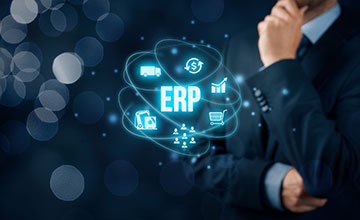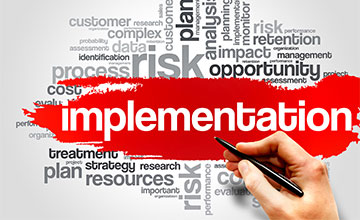If you are considering an ERP system and unsure whether a cloud hosted solution is the right path for your business, you’ve came to the right place. Through this article we outline 10 of the top benefits associated with choosing a cloud based ERP solution over its on-premise alternative.
1. No upfront payment for hardware = better cash flow
One of the most compelling benefits to leveraging a cloud ERP system vs. an on-premise ERP is the lower cost of implementation and future maintenance. As a cloud ERP usually comes on a subscription basis through a dedicated provider or partner, there is usually no, or limited upfront purchasing costs involved. There may however be costs associated with some aspects of implementation, data migration, or training, but these will typically be a fraction of the costs involved if deploying an on-premise solution.
An on-premise ERP solution will require the purchasing of IT hardware and related licenses, along with staff to install and maintain it. With a cloud based ERP system, you will typically pay a flat-monthly fee with future upgrades and maintenance typically handled by the cloud ERP provider or a dedicated partner.
2. All related IT expenses can be allocated to OpEx
A key benefit to the financial controllers of any organisation would be the ability to switch the costs of an ERP implementation into OpEx as opposed to CaPex.
Through a cloud ERP implementation you effectively switch all of your costs from CaPex to OpEx and you don’t have to worry about aspects like depreciation of hardware. This will reduce accounting challenges and improve overall cashflow of the business.
3. No need to hire internal IT staff to handle hardware
As the hardware and infrastructure is maintained by the cloud ERP provider, you don’t need to invest in any internal IT staff to handle the set-up or maintenance of the system. This is handled by the service provider.
Removing the cost and hiring challenges associated with maintaining your own in-house IT team can be a significant benefit. The physical cost is one aspect, but you are also removing the headache associated with the hiring and retention of employees, and the handover of skills/knowledge when existing employees leave the organisation.
This aspect is often overlooked, but can be one of the most significant business benefits associated with implementing a cloud based ERP solution.
4. You don’t need to worry about fixing or replacing hardware
As you don’t require any physical hardware, there is no need for your business to worry about maintaining, fixing, or replacing it over time, which removes the need for CaPex costs and accounting for the depreciation of hardware.
The maintenance, replacement, or upgrading of hardware sits firmly under the responsibility of the service provider.
5. Cloud ERP enables faster implementation vs. on-premise solutions
Another core benefit of a cloud based ERP system is the speed at which it can be implemented and providing business value vs. the alternative on-premise solution.
With everything hosted in the cloud, there is no costly implementation of on-site infrastructure required, so providing the appropriate upfront due diligence has been performed, a cloud ERP system can be up and running almost immediately.
6. You gain access to regular updates, constantly enhancing your solution
Providers of cloud based ERP solutions are able to deliver new functionality and performance improvements through continuous upgrades. These regular updates ensure that your ERP solution remains highly competitive within the market, both in terms of functionality, user experience, and performance.
Another benefit can be if companies using the same solution identify similar requirements, they can collectively push the vendor for changes to address those needs or pain points.
As a result, the overall pace of innovation is significantly faster when using a cloud based solution.
7. Great user experience increases end user buy-in
It is not uncommon for IT organisations to celebrate the deployment of a solution, only to forget about the additional challenge of driving user adoption. It is also fair to say that on-premise ERP solutions have tended to provide a less than optimal end-user experience. With a cloud ERP solution, the overall user experience is typically much improved and continues to be improved through feedback and regular upgrades.
It is also in the interests of the provider to work with you to ensure adequate training and adoption of the solution during, and after deployment. In the past, ERP solutions required significant upfront capital expenditure, but with the move to the cloud, vendors are now ever more focused on ensuring your renewal of their services.
If end-users don’t like using the solution, it has never been easier for a business to switch to another provider.
8. Far greater levels of security
Security attacks and data breaches have become common news in recent times, and this has led to many more companies turning their attention towards cloud based ERP systems. Whilst some may worry about the security of a cloud based solution vs. on-premise, they perhaps don’t realise just how vigilant and sophisticated many cloud ERP vendors have become in regards to the security of their core systems, and that of their customers.
Cloud vendors have a lot to lose. Security and uptime of their systems are core requirements to maintaining client confidence. As a result of often hosting the ERP systems of many companies, these vendors can also become prime targets for security attacks, which may sound like a disadvantage, but often the reverse is true. It has forced these vendors to develop sophisticated security protocols and ensure their systems are monitored and handled by full-time, professional security experts.
In reality, the leading cloud ERP vendors provide a far more secure environment than most standalone companies will be able to develop and maintain themselves.
9. Easier to scale users up and down aligned to business growth or potential downturn cycles
It can be hard to predict the future, and thus scalability is important when considering your ERP solution. When times are good and your business is growing, you can easily add new users, modules, languages, computing power, or data storage to handle your extra needs.
In the unfortunate circumstance when business turns less favorable, you can simply reduce the number of users, and tone down other factors to reduce your monthly outgoings accordingly.
This flexibility will allow you to better manage your expenditure based on your current circumstances.
10. Allow access to your systems from anywhere, or any device
In this day and age it is an basic requirement that businesses provide information access to its employees, subcontractors, vendors, and customers – at any time, from anywhere.
Any worthwhile cloud ERP vendor will provide easy system access through dedicated mobile applications. As these solutions were “born in the cloud” you can anticipate that the user interfaces will be responsive and designed to fit and function well on mobile devices.
This can be a critical component in driving user adoption and end-user positivity around the application. Imagine for example a service based organisation with technicians installing or repairing items for customers on-site. A modern cloud ERP solution will provide easy access for technicians to update jobs, request replacement parts etc all via their mobile phone.




